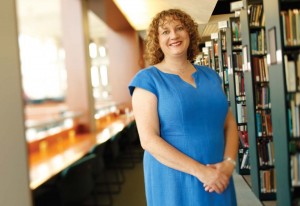A Closer Look
March 12, 2013 | Carole Bartoo

Kate McReynolds, MSC, MSN, ANP-BC. Photo by John Russell
When Kate McReynolds, MSC, MSN, ANP-BC, teaches cancer genetics to nursing students, she uses the analogy of a library. A human cell’s nucleus is the physical building, filled with shelves we call chromosomes. On each shelf are hundreds of books called genes. Each book, or gene, contains a recipe for a protein, and together those recipes tell the story of the human form.
“But what if you change just one letter of one word in the recipe?” she asks the class. “In a gingerbread recipe, for example, what if the word ginger changed just its first letter to an F. You’d have a recipe calling for two teaspoons of ‘finger.’ That would be a mess.”
McReynolds gets a good laugh with this line, but she uses the example to make a serious point: that sometimes a small error can add cancer to anyone’s personal story.
The literary analogies help McReynolds in her work. She is a genetics nurse practitioner in the Hereditary Cancer Clinic. When patients come to see McReynolds, they want answers. They want to know what their genes can tell them about their risk for cancer.
“Five to 10 percent of all cancer is hereditary. Sometimes we can pinpoint a specific change in a gene that will explain the cancer in a family, but sometimes we are unable to find it even though the family story of cancer tells us this has to be hereditary,” McReynolds said.
Patients come for a one-to-two-hour visit, beginning with a review of their personal medical history and their family history of cancers – at least three generations back. Once the family tree is drawn and their risk assessed, McReynolds works to understand hopes and fears about genetic testing.
“People have to be ready for the information and have to be able to put it into perspective. Genetic testing can be very empowering,” McReynolds said.
Those who are negative for a known familial mutation can feel tremendous relief that they are not at increased risk for cancer. Those who test positive can make potentially life-saving medical decisions.
“But it is also important to realize that once a person learns the definitive answer to a genetic test, they cannot unknow it,” she said.
McReynolds’ strong feelings about the deeply personal and ethical concerns inherent in her work serve her well. After all, the U.K.-born and -trained nurse followed her heart into this business.
“It was a calling. I thought I would be a nurse for children with learning disabilities. Then I did a week of work experience on an adult ward, and I came home that first day and cried and cried because I knew beyond a shadow of a doubt that oncology was what I had to do,” she recalled. “You have the relationships with the patients. I consider it a privilege that they share their pain and fears as well as their hopes and dreams for the future.”
This year, cancer was written into McReynold’s own family story. She recently returned to the U.K. to be with her brother who was diagnosed with brain metastasis from a previously undetected lung cancer. There is no familial risk to her or other family members, but she knows one day soon she will lose him to this cancer.
“I am all the time drawing pictures of family histories and drawing lines through siblings to indicate they are deceased. My brother is 46 years old. Hopefully I was empathetic before, but now I really have empathy for someone whose sibling has cancer and especially a young cancer,” she said.
McReynolds uses genetic counseling to help people understand the part of their story genes tell, but her great hope is that, increasingly, through cancer genetics research, medicine will be able to change the storylines for the better.
But so far, unlike books in a library, there is no skipping to the end to see what happens.
– by Carole Bartoo
